10 Different Types of Excavator Bucket Teeth

George Yang | Founder at EPO
Hi, I'm George Yang, here to share my expertise in excavator parts with you.
Table of Contents
Have you ever wondered if your excavator is delivering maximum efficiency? The right bucket teeth can boost productivity and reduce costs for your business.
With extensive industry expertise, we know how the right excavator bucket teeth make a difference in performance.
Let’s take a quick look at 2 important types you should consider:
- Standard Chisel Teeth
- Tiger Teeth
In this guide, you’ll discover 10 different types of excavator bucket teeth, along with their best uses and benefits for various applications.
So let’s get down to it!
1. Quick Comparison Chart
Excavator bucket teeth come in various designs, each tailored to specific digging tasks. The right tooth can enhance performance, reduce wear, and increase efficiency. Here’s a detailed comparison chart of the 10 most common types of excavator bucket teeth:
| Bucket Tooth Type | Description |
| 1. Standard Chisel Teeth | Versatile, general-purpose teeth ideal for medium digging tasks. Best for soft to medium soils, used in tasks like trenching and general earthmoving. |
| 2. Tiger Teeth | Sharp, pointed teeth designed for hard, compacted ground, offering deep penetration. Best for breaking through rocky or dense soil, ideal for tough excavation jobs. |
| 3. Flare Teeth | Wide, flat design perfect for scooping and removing loose materials like sand or soft soils. Often used in high-volume, fast-moving jobs for efficient material handling. |
| 4. Rock Chisel Teeth | Durable and designed for breaking through hard surfaces like rock or concrete. Ideal for quarrying, mining, and other heavy-duty applications involving hard materials. |
| 5. Penetration Teeth | Narrow, aggressive teeth built for deep digging in hard-packed or frozen ground. Best for tough soils where deep penetration is necessary. |
| 6. Heavy-Duty Abrasion Teeth | Built to handle abrasive environments like gravel pits, quarries, and mining. These teeth are reinforced for long-lasting durability and performance in harsh conditions. |
| 7. Fanggs Teeth | Featuring a dual-pointed design, fanggs teeth offer maximum penetration in hard soils like clay and compacted materials, making them excellent for tough digging jobs. |
| 8. Twin Tiger Teeth | Equipped with two sharp points for enhanced cutting power and stability, these teeth are ideal for breaking through dense, compacted soils. |
| 9. Spade Teeth | Flat and wide, spade teeth are designed for leveling and finishing work in soft soils. They provide smooth, even surfaces, ideal for cleanup and leveling jobs. |
| 10. Helilok Teeth | Known for their secure locking mechanism, helilok teeth are used in heavy-duty environments where secure attachment is vital, such as mining and large-scale earthmoving. |
2. Standard Chisel Teeth
Standard Chisel Teeth are crafted for both strength and functionality, providing reliable performance in various excavation tasks. Their design offers durability, especially in tough working conditions. Here are the specifications for Standard Chisel Teeth:
Specifications:
- Material: High-strength alloy steel
- Design: Narrow, pointed chisel tip
- Hardness: 50-60 HRC
- Compatibility: Standard excavator/backhoe attachments
- Dimensions: Length 200-300 mm, Width 50-80 mm, Thickness 20-30 mm
- Edge: Sharpened for penetration
- Wear Resistance: Heat-treated or carbide-coated tip
- Mounting: Pin-lock or bolt-on
- Use: Tough soil, rocky terrain
- Weight: 2-5 kg
Application:
- Soft to Medium Ground: These teeth are perfect for digging in soft to medium soil conditions. Their balanced design provides efficient digging without putting too much strain on the excavator.
- Riverbeds and Harbors: Standard chisel teeth are effective for dredging tasks in riverbeds and harbors, efficiently clearing sediment and debris. Their flat, broad design handles both wet and dry materials with ease, allowing for smoother maintenance of waterways.
- Site Work: Standard chisel teeth are ideal for general site work, excelling in tasks like material movement and surface preparation. Their wide, durable design handles various materials effectively, making them perfect for tasks like clearing or spreading soil. For example, they work well when quickly moving or leveling loose soil.
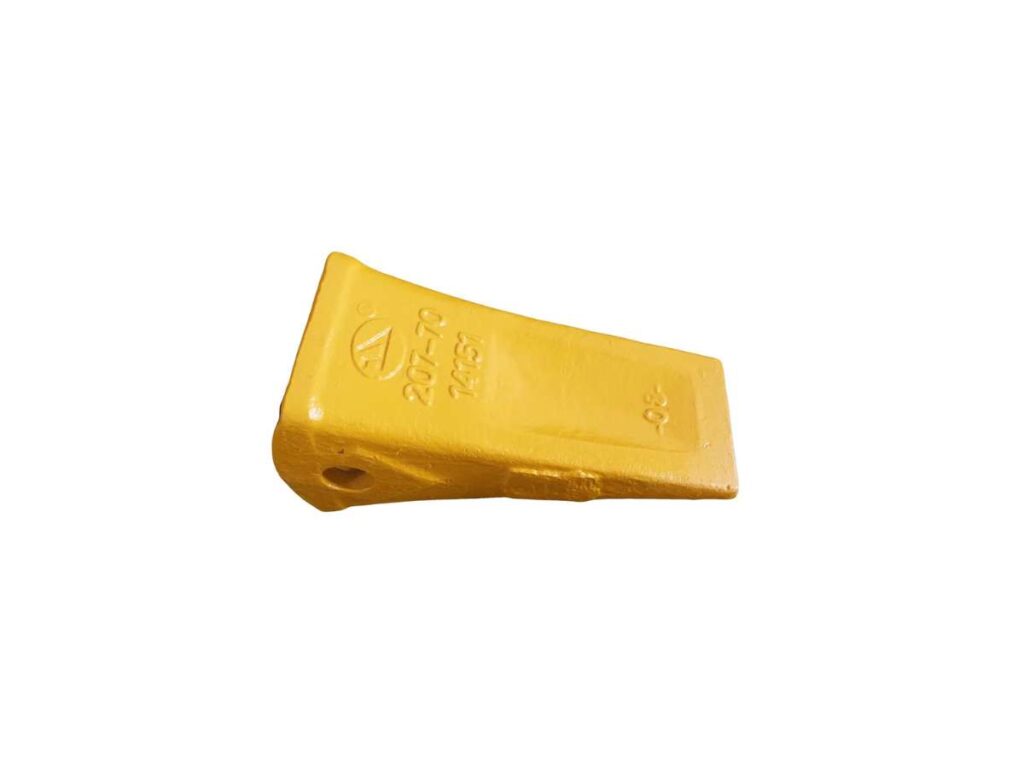
3. Tiger Teeth
Tiger Teeth are built for superior penetration in tough conditions. These teeth stand out due to their sharp design, making them ideal for breaking through compact and hard surfaces. Specifications for Tiger Teeth include:
- Material: Alloyed carbon steel
- Design: Pointed chisel tip
- Hardness: 50-60 HRC
- Compatibility: Standard excavator/backhoe attachments
- Dimensions: Length 220-280 mm, Width 55-75 mm, Thickness 25 mm
- Edge: Sharpened for efficient cutting
- Wear Resistance: Carbide-coated tip
- Mounting: Pin-lock or bolt-on
- Use: Hard-packed soil, rocky terrain
- Weight: 3-4 kg
Application:
- Hard and Rocky Ground: Tiger teeth are designed to easily break through hard and rocky terrain. Their sharp points allow deep penetration into compact surfaces, making them essential for tough digging tasks.
- Tile and Trenching for Precision Cuts: Tiger teeth are excellent for making precise cuts when installing tiles or digging narrow trenches. This makes them useful in agricultural projects, like creating drainage systems, where accurate and clean trenching is crucial.
- Demolition Tasks: Tiger teeth are highly effective in demolition work. Their sharp edges make it easier to cut through rigid surfaces, providing greater control and efficiency in breaking down hard materials.
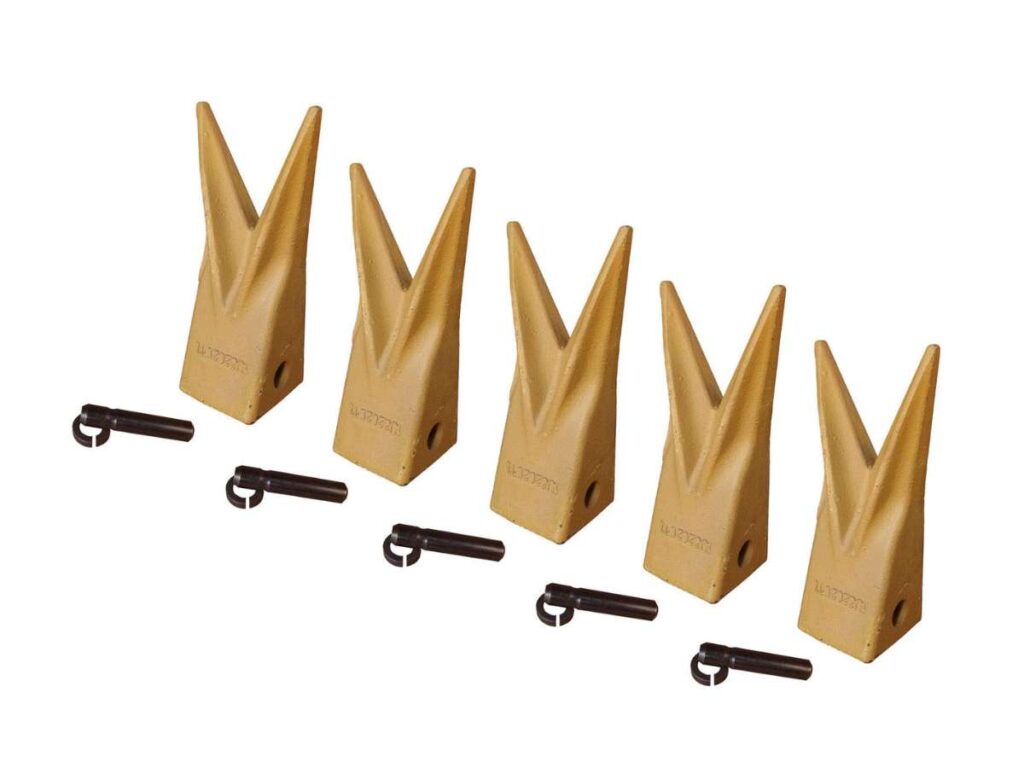
4. Flare Teeth
Flare Teeth are designed to handle softer materials efficiently, making them a great choice for light excavation tasks. Their wide shape and durable construction allow for faster scooping and improved productivity in soft ground conditions. Specifications include:
- Material: Manganese steel
- Design: Wide, flared tip for maximum coverage
- Hardness: 45-55 HRC, balanced for strength and flexibility
- Compatibility: Standard attachments for excavators and backhoes
- Dimensions: Length 180-250 mm, Width 80-100 mm, Thickness 25 mm
- Edge: Blunt edge for broader surface engagement
- Wear Resistance: Heat-treated to handle regular wear
- Mounting: Easy pin-lock or bolt-on installation
- Use: Best for loose soil, sand, and gravel
- Weight: 3-5 kg
Application:
- Pond Digging: Flare teeth are effective for digging ponds and creating leveled surfaces. Their wide surface area aids in both material removal and achieving a flat bottom, which is crucial in projects like garden ponds.
- Landscaping: Flare teeth are perfect for leveling soft ground during landscaping or grading tasks. Their broad surface ensures even material distribution, resulting in a smooth, level finish.
- Foundation Work: Due to their ability to create a smooth, flat surface, flare teeth are useful in preparing foundations for construction projects. Their wide design helps in efficiently leveling the ground before laying the foundation.
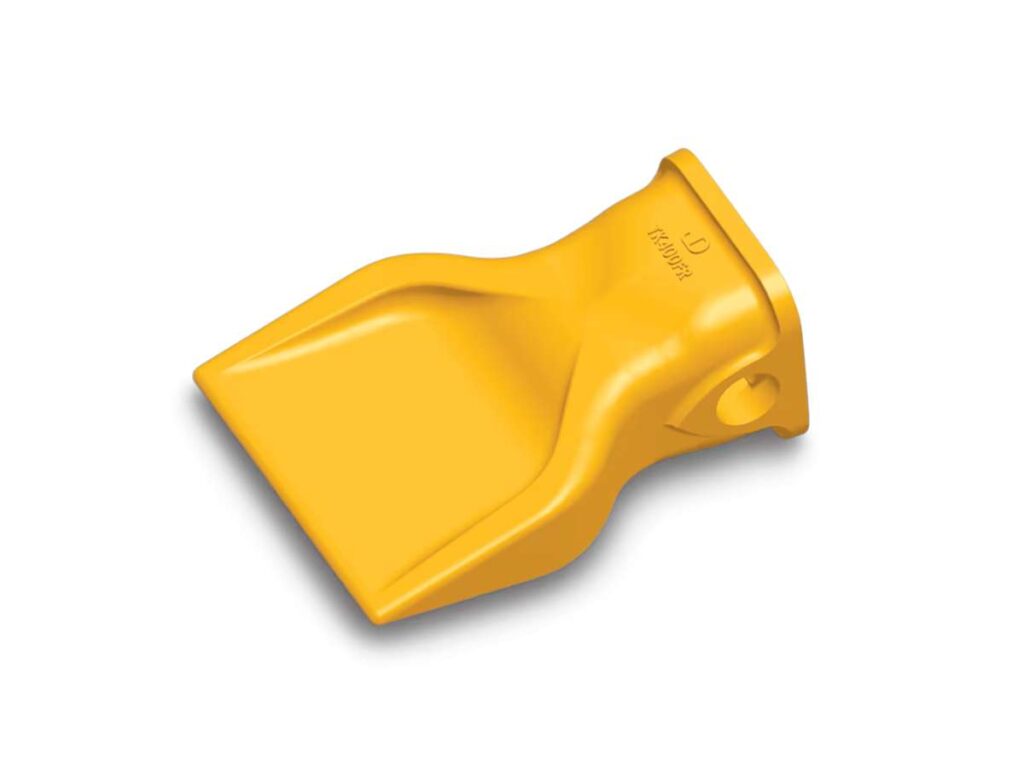
5. Rock Chisel Teeth
Rock Chisel Teeth are built to handle extremely tough, abrasive conditions. Their robust design allows them to break through hard surfaces like rock and compacted ground with ease. Key specifications are as follows:
- Material: Chromium steel
- Design: Broad, reinforced tip for added strength
- Hardness: 60-65 HRC for exceptional durability
- Compatibility: Fits most heavy-duty excavator models
- Dimensions: Length 220-300 mm, Width 70-90 mm, Thickness 30-35 mm
- Edge: Thick edge to minimize wear on rough surfaces
- Wear Resistance: Carbide-coated for enhanced abrasion resistance
- Mounting: Available in pin-lock or bolt-on options
- Use: Rocky, high-abrasion environments
- Weight: 4-6 kg
Application:
- Breaking Through Sedimentary Rock: Rock chisel teeth are highly effective in breaking apart softer rock types, such as shale and sandstone, which are often found in sedimentary rock formations.
- Compacted Ground: In areas where the ground is compacted or densely packed, rock chisel teeth perform well. Their shape and weight allow them to penetrate deep into tough surfaces, making them essential for excavation in difficult conditions.
- Demolition and Quarrying: For demolition tasks or quarrying applications, rock chisel teeth provide the heavy-duty performance needed to handle hard materials. Their strong construction helps excavators break through and move heavy, dense materials efficiently.
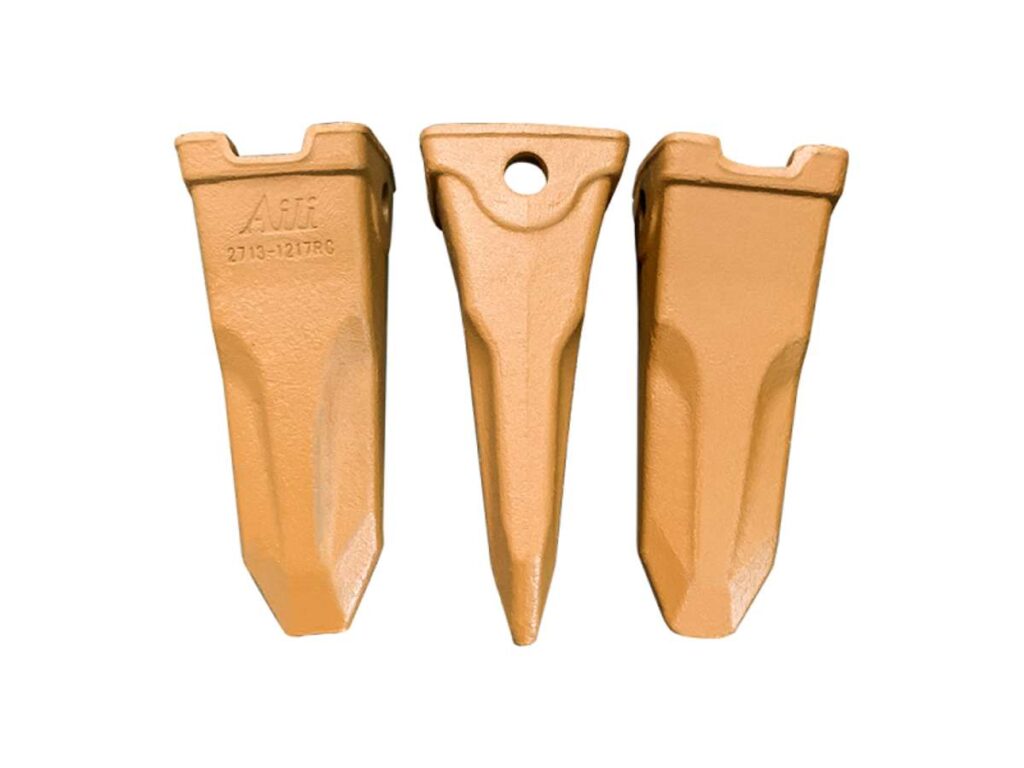
6. Penetration Teeth
Penetration teeth are designed to tackle hard and compact surfaces with their streamlined shape, which allows for better depth and precision in excavation. Their strong build and narrow profile make them ideal for digging into tough ground conditions. Specifications are as follows:
- Material: Tempered steel
- Design: Slim, pointed tip for focused penetration
- Hardness: 50-60 HRC, ensuring resilience
- Compatibility: Fits most excavator models
- Dimensions: Length 190-260 mm, Width 40-60 mm, Thickness 20 mm
- Edge: Tapered edge to cut through dense layers
- Wear Resistance: Hardened tip to resist abrasion in tough soils
- Mounting: Uses pin-lock or bolt-on method for secure fit
- Use: Optimized for compacted and clay-rich soils
- Weight: 2-3 kg
Application:
- Utility and Pipe Installation: Penetration teeth are vital for creating deep, precise trenches, allowing space for components like excavator sensors. Their clean cuts make installation easier. AT Epo, we offer essential parts like excavator sensors, providing reliable tools for these projects.
- Frozen Ground: These teeth excel at breaking through frozen soil, where other tooth types might struggle. Their sharp, pointed design allows for deep penetration into frozen layers, improving excavation performance in colder environments.
- Roadwork: Penetration teeth are ideal for roadwork projects that involve breaking through cemented gravel or compacted soil. Their sharp tips allow for efficient digging and loosening of tough materials commonly encountered in road construction.
7. Heavy-duty Abrasion Teeth
Heavy-duty abrasion teeth are built to endure the toughest conditions, specifically designed for use in environments where high abrasion is common. Their enhanced durability makes them ideal for challenging excavation tasks, particularly in abrasive soils and materials. Below are the key specifications:
- Material: Tungsten-reinforced steel
- Design: Broad, reinforced tip for added strength
- Hardness: 60-65 HRC for exceptional durability
- Compatibility: Fits most heavy-duty excavator models
- Dimensions: Length 220-300 mm, Width 70-90 mm, Thickness 30-35 mm
- Edge: Thick edge to minimize wear on rough surfaces
- Wear Resistance: Carbide-coated for enhanced abrasion resistance
- Mounting: Available in pin-lock or bolt-on options
- Use: Ideal for rocky, high-abrasion environments
- Weight: 4-6 kg
Application:
- Mining Operations: In mining operations, where long-lasting performance is crucial, heavy-duty abrasion teeth are essential for efficient digging. These teeth help access deeper layers of material, which may involve the need for parts like excavator motor assy, reliable parts, such as those from Epo, support the performance of excavators in harsh environments.
- Quarry Work: In quarries, where gravel, stone, and other abrasive aggregates are encountered, these teeth excel. Their durability and wide shape help them endure constant friction. For example, when cutting through granite, they resist wear, reducing the need for frequent replacements.
- Excavating in Abrasive Soils: These teeth perform exceptionally well in environments with abrasive soils like sand, gravel, or rocky terrain. Their carbide-reinforced edges and wide design allow them to maintain performance even after prolonged exposure to harsh conditions.
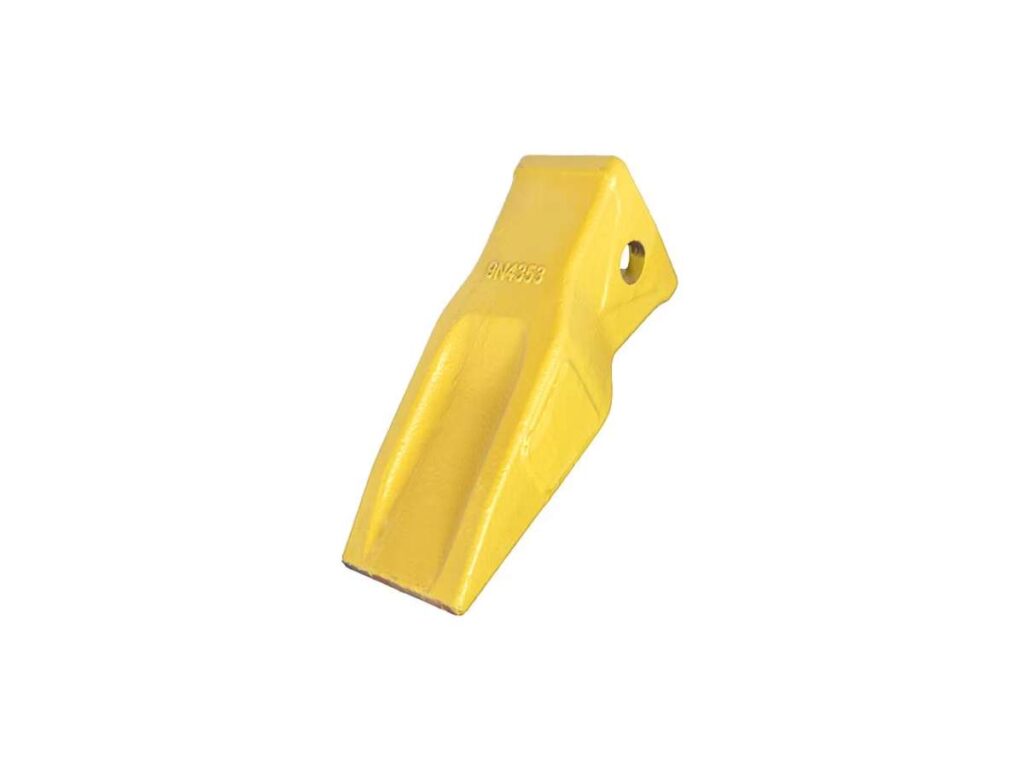
8. Fanggs teeth
Fanggs teeth are built for tough excavation jobs, specifically designed to excel in compacted soils and rocky terrain. Their unique construction and shape make them perfect for tasks that require deep penetration and cutting power. Below are the key specifications:
- Material: Nickel alloy steel
- Design: Twin-pointed tip for enhanced cutting efficiency
- Hardness: 55-60 HRC to withstand tough conditions
- Compatibility: Compatible with most excavators and backhoes
- Dimensions: Length 200-270 mm, Width 45-70 mm, Thickness 25 mm
- Edge: Sharpened twin-edge for better grip and penetration
- Wear Resistance: Heat-treated for increased resistance in abrasive soils
- Mounting: Secure pin-lock or bolt-on installation
- Use: Best for rocky or compacted soil applications
Application:
- Clearing and Grading: Fanggs teeth are great for clearing debris and grading surfaces. Their design allows for efficient removal of tree roots and other tough vegetation during land-clearing operations, making them useful in both agricultural and construction projects.
- Water Bodies: Fanggs teeth are particularly effective for dredging and sediment removal in water bodies such as rivers, lakes, and harbors. Their strong, dual-point design makes it easier to cut through layers of sediment and silt, allowing for efficient clearing in dredging operation.
- Rip and Strip Tasks: Fanggs teeth can be employed in ripping tasks where breaking and stripping layers of hard soil or compacted ground is needed. This makes them ideal for mining and similar high-impact excavation jobs, particularly in operations where quick penetration is essential.
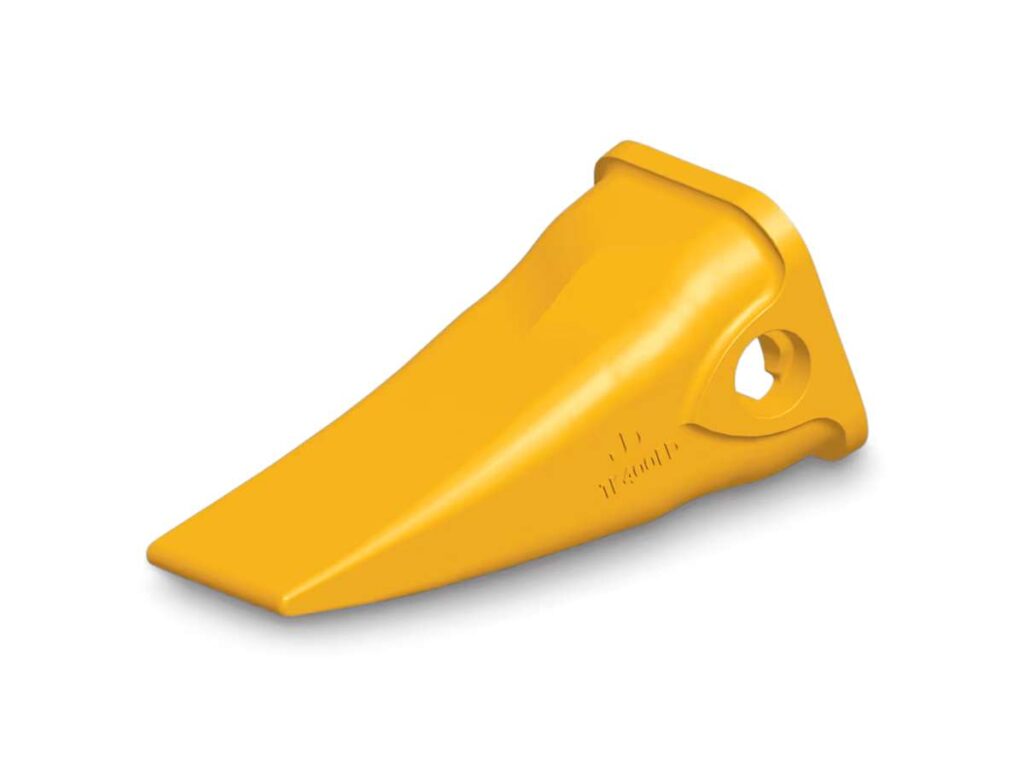
9. Twin Tiger Teeth
Twin tiger teeth are designed for maximum penetration in compact and rocky soils. With two sharp points, they provide exceptional cutting power, making them ideal for challenging excavation tasks. Below are the key specifications:
- Material: Reinforced alloy steel for added longevity
- Design: Dual sharp points for enhanced penetration
- Hardness: 55-65 HRC to handle intense conditions
- Compatibility: Compatible with a range of standard excavators
- Dimensions: Length 200-280 mm, Width 45-65 mm, Thickness 25 mm
- Edge: Double-edge tip to improve cutting power
- Wear Resistance: Hardened surface for better performance in abrasive environments
- Mounting: Pin-lock or bolt-on attachment options
- Use: Suited for hard, compact soils and rock
- Weight: 3-4 kg
Application:
- Tree Removal and Root Cutting: Twin tiger teeth are ideal for clearing trees and cutting through thick roots during land-clearing operations. Their sharp, dual-pointed design makes them highly effective for slicing through stubborn root systems and vegetation.
- Demolition of Concrete Structures: These teeth perform exceptionally well in demolition projects, particularly when breaking through concrete. Their pointed shape provides a focused impact, allowing for easier penetration and breaking apart of concrete surfaces.
- Dredging and Silt Removal: In dredging applications, twin tiger teeth are used to remove sediment and silt from water bodies. They offer the penetration power necessary for digging through layers of soft sediment while providing enough strength to handle debris and compacted material found in rivers or harbors.
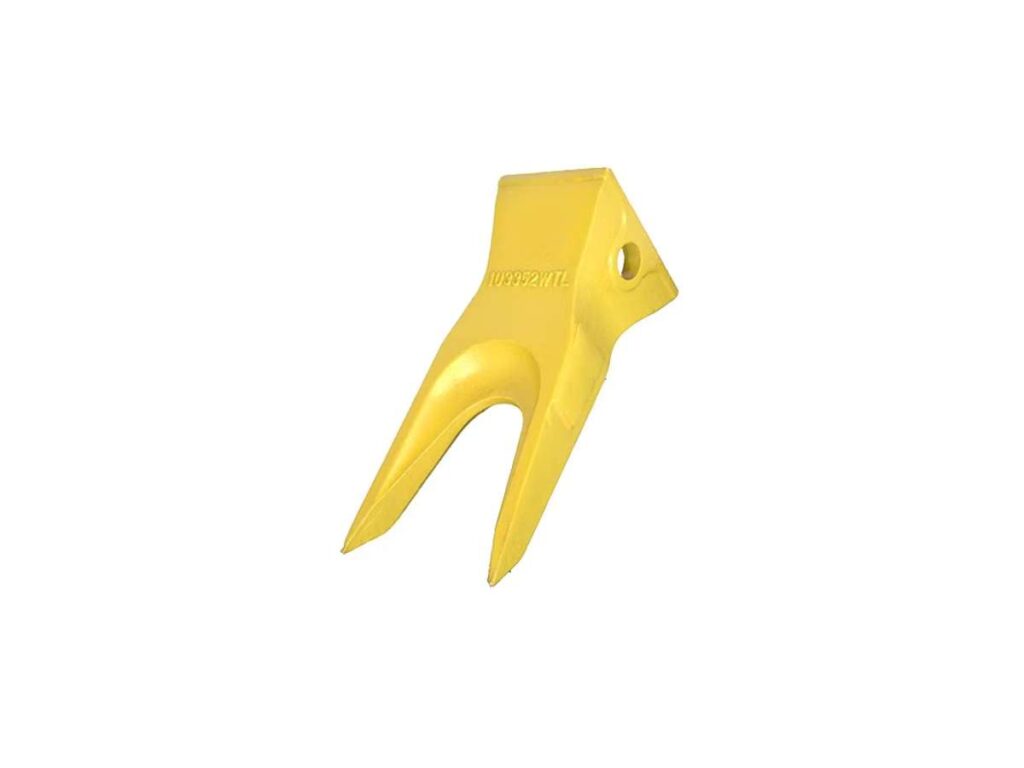
10. Spade teeth
Spade teeth are designed for applications that require scooping and leveling soft or loose materials. Their wide, flat design makes them ideal for handling a variety of light excavation tasks, especially in soft soils. Below are the key specifications:
Material: Manganese steel
- Design: Wide, flat tip
- Hardness: 50-55 HRC
- Compatibility: Standard excavator buckets
- Dimensions: Length 180-240 mm, Width 70-100 mm, Thickness 20-25 mm
- Edge: Flat for efficient material handling
- Wear Resistance: Anti-wear coating
- Mounting: Pin-lock or bolt-on
- Use: Suitable for soil, sand, gravel
- Weight: 3-5 kg
Application:
- Sticky Ground: Spade teeth are particularly useful for working in sticky or wet ground, such as clay or mud. Their flat, wide design helps prevent material from getting stuck, which is a common issue in such environments. This makes spade teeth ideal for tasks like pond digging or drainage projects in wetter soils.
- Garden Bed Preparation: Spade teeth can be used to create garden beds or prepare areas for planting. Their broad shape allows for efficient material movement and leveling, creating smooth surfaces for gardens or green spaces.
- Clean-up Operations: Spade teeth are also effective for cleanup tasks on job sites, particularly when removing loose debris or smoothing out uneven ground. Their flat design makes them versatile for a range of finishing and clean-up operations.
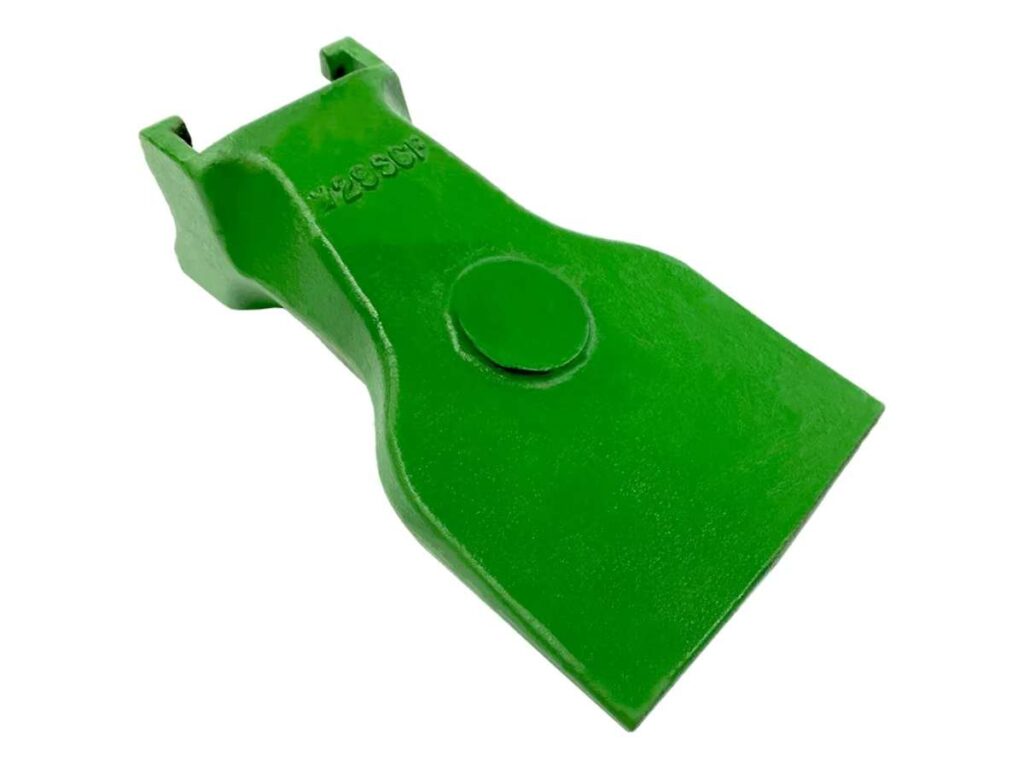
11. Helilok teeth
Helilok teeth are known for their secure attachment system and durability in heavy-duty excavation tasks. They are designed to stay firmly in place, even under intense pressure, making them highly reliable in demanding environments. Below are the key specifications:
- Material: Boron steel
- Design: Helical shape
- Hardness: 55-60 HRC
- Compatibility: Heavy-duty excavators
- Dimensions: Length 200-270 mm, Width 60-85 mm, Thickness 25 mm
- Edge: Curved for efficient digging
- Wear Resistance: Hardened for abrasion
- Mounting: Pin-lock system
- Use: Hard-packed and rocky soil
- Weight: 3-4 kg
Application:
- General Earthmoving Tasks: Helilok teeth are often used in general earthmoving applications, providing efficient digging and material handling in a variety of ground conditions. Their self-sharpening profile makes them well-suited for everyday tasks in construction and other heavy-duty projects.
- Road Construction: In road construction, where compact and tough surfaces are encountered, helilok teeth perform well by maintaining sharpness over time. They are particularly useful for breaking through compacted soil, gravel, and even some types of concrete
- Municipal and Governmental Excavation Projects: Helilok teeth are highly effective in governmental projects, such as road and infrastructure developments, where durability and minimal maintenance are essential. Given the increasing scale and complexity of these projects, insights from MRF indicate that the infrastructure construction market could grow around USD 4.34 billion by 2032.
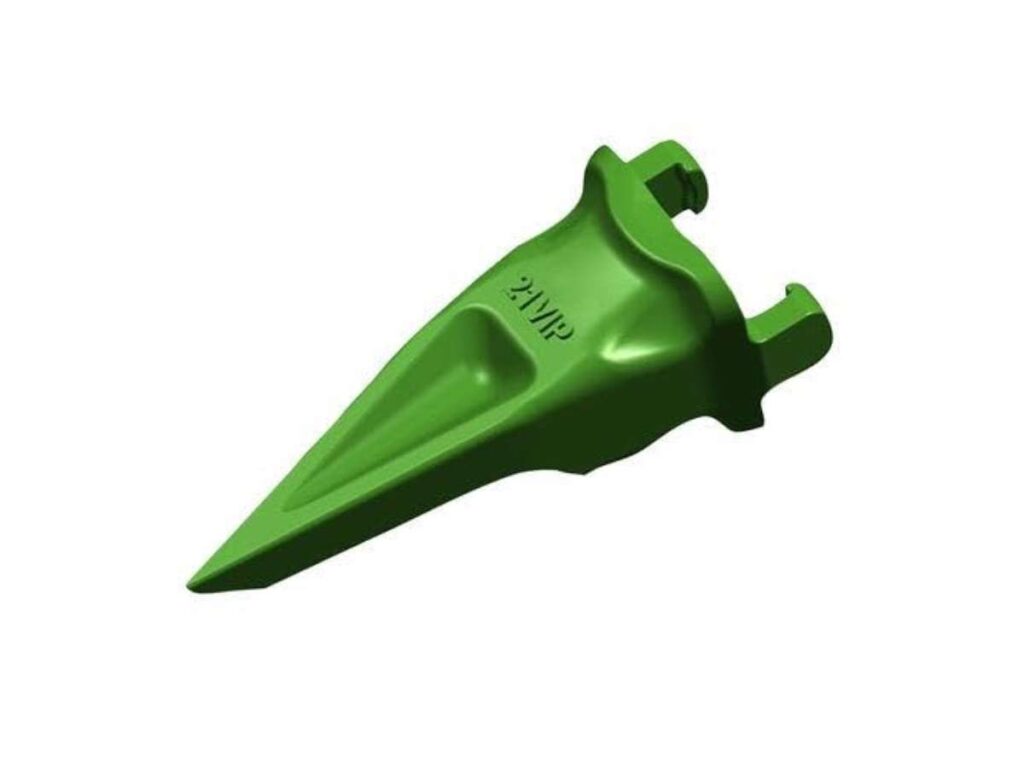
Conclusion
Excavator bucket teeth come in various types, each designed for specific tasks. Choosing the right teeth can significantly improve digging efficiency, whether you’re working in soft soil or tough rock. Understanding these types helps you select the best fit for your project.
We hope this guide helps you choose the best bucket teeth for your project’s needs. If you’re looking for a trusted excavator parts supplier, Epo is ready to meet your needs with quality parts and exceptional service. While many in the industry struggle with delayed quotations, Epo stands out by offering fast, same-day quotes to keep your projects on track. Contact us today for more information.
Table of Contents
Recent Posts
Quick Quote
Fill out the form, get the quote in hours!
Recent Blogs
Sorry, we couldn't find any posts. Please try a different search.




